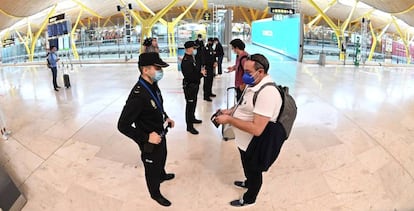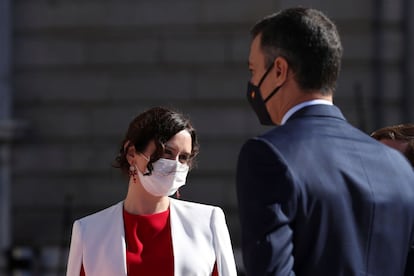Spanish government rules out lifting state of alarm in Madrid
Health Minister Salvador Illa says the emergency measure will remain in place until the region sees a larger fall in coronavirus transmission

Spanish Health Minister Salvador Illa said on Tuesday that the state of alarm declared in the Madrid region on Friday will remain in place until there is a significant drop in coronavirus transmission rates. Speaking during an interview with the Cadena SER radio network, Illa said: “We will lift it as soon as possible, but we have to see how the pandemic evolves in Madrid.”
The 14-day cumulative number of coronavirus cases in Madrid fell to 502 per 100,000 inhabitants on Monday, but Illa said this was not enough. “The cumulative incidence [of the virus] has to drop a lot more, not just below 500 cases [per 100,000 inhabitants], but to below at least 200, and ideally below 100,” he said.
Speaking at a press conference on Tuesday, Spanish government spokesperson María Jesús Montero added: “The data shows that there is community transmission in Madrid and we have to take measures now. They are truly worrying figures.”
The central government declared a state of alarm in Madrid on Friday in a bid to slow the spread of the coronavirus in the region, which has once more become the epicenter of the coronavirus pandemic in Spain. Under the emergency measure, nine cities in Madrid – including the Spanish capital – were placed under a perimetral lockdown, meaning residents can only enter or leave for essential business. The confined areas are also subject to restrictions on social gatherings, with reduced capacity and opening hours for bars and restaurants, as well as other commercial stores.
The cumulative incidence of the virus in Madrid has to drop a lot more, not just below 500 casesHealth Minister Salvador Illa
The move was fiercely opposed by the Madrid administration, which claimed the restrictions would hurt business in the region. The question of how to contain the coronavirus pandemic has been the source of an ongoing dispute between the central government, headed by a center-left coalition of the Socialist Party (PSOE) and Unidas Podemos, and the Madrid government, run by a center-right alliance of the Popular Party (PP) and Ciudadanos (Citizens), propped up by the far-right Vox.
Illa defended the government’s decision to declare a state of alarm despite opposition from Madrid premier Isabel Díaz Ayuso, of the PP. “All of us want more time,” he told the radio station. “But we have to act.”
The state of alarm is valid for 15 days, after which time it must be extended with the approval of Spain’s lower house, the Congress of Deputies – a difficult challenge given that the coalition government does not have an absolute majority. Spanish Prime Minister Pedro Sánchez said at the weekend that there were no plans to extend the emergency measure beyond the two weeks.
But the Madrid administration is set to ask the central government to immediately lift the emergency measure at the meeting of the Covid-19 working group scheduled for 7.30pm on Tuesday. Sánchez and Ayuso agreed to this group – which includes Illa and Madrid regional health chief Enrique Ruiz Escudero – in late September in an unsuccessful bid to thaw tensions.

Ahead of the meeting, the Madrid region continued its attacks against the central government. Ayuso called the Sánchez administration “authoritarian” in an interview with the Financial Times, while Ruiz Escudero told the radio station RTVE that the state of alarm had turned Madrileños into “hostages.”
Regional leaders in Spain have warned that the ongoing conflict between the Madrid and Spanish government must come to an end. “In a pandemic, we all have the duty to empathize with our adversary,” Juan Manuel Moreno, the PP premier of Andalusia, told EL PAÍS at Spain’s National Day celebrations on Monday.
Alfonso Fernández Mañueco, the PP premier of Castilla y León, which borders Madrid, agreed: “We are facing one of the most difficult moments of our history. Regions on the border [of Madrid] will be affected the most, but the virus doesn’t understand ideologies or borders. [...] Stopping the virus and preventing its spread implies sacrifice.”
“Our relationship with the Health Ministry is absolutely normal,” added Miguel Ángel Revilla, the premier of Cantabria, of the Cantabria Regional Party (PRC). “I have spoken with other premiers and they tell me the same thing. This visceral conflict is only happening in Madrid.”
Madrid High Court appeal
Health Minister Illa also confirmed that the Spanish public prosecutor would appeal the Madrid High Court ruling that struck down the perimetral lockdowns in the Madrid region.
Under the Health Ministry’s rules, which were agreed to by a majority of Spain’s regions, a city of more than 100,000 inhabitants must be confined if it exceeds the following thresholds: a 14-day cumulative number of coronavirus cases above 500; a positivity rate above 10%; and intensive care unit (ICU) occupancy over 35%.
The Madrid region was forced to confine 10 cities that met these criteria, but appealed the restrictions to the Madrid High Court, which ruled that the central government could not limit the fundamental right of freedom of movement without resorting to a state of alarm. The Castilla y León High Court, however, ratified the implementation of the same measures in the municipalities of León, Palencia and San Andrés del Rabanedo.
According to the public prosecutor, current health laws are enough to introduce perimetral lockdowns in municipalities. It argues that freedom of movement can be limited without a state of alarm as long as the restrictions are proportional and aimed at protecting the right to life and health.
To prevent different regional courts from reaching different interpretations of the law – as has happened in Madrid and Castilla y León – the public prosecutor has also called on the Supreme Court to “urgently” unify the court’s position on this issue.
Restrictions in Catalonia
The Catalan regional government said on Tuesday that it is planning to introduce new restrictions on social activity and movement in a bid to curb coronavirus contagion. The northeastern region has seen an alarming spike in cases, and counts on 984 Covid-19 patients in hospital, 172 of whom are in intensive care, according to the Catalan health department.
From Friday, bars and restaurants will face new restrictions on capacity and opening hours, as well as more preventive measures, according to Marc Ramento, the secretary-general of the Catalan health department. Speaking in an interview with the RAC 1 Catalan-language radio station, Ramento said the measures – which have not been formally set – are aimed at the food and drink sector, which he blamed for the rise in cases.
But Meritxell Budó, the spokesperson for the Catalan government, was vaguer about the plans, indicating only that the measures will be “a mix of recommendations with more drastic measures that will affect different sectors.” The new rules are set to be officially announced in the coming hours and be approved between Thursday and Friday. Budó, who described the situation as “very worrying,” said that perimetral confinements were not being considered.
Measures in Granada
The regional Andalusian government announced new measures on Tuesday aimed at curbing coronavirus contagion in Granada after hundreds of revelers were caught violating safety measures at long-weekend parties.
Authorities have banned in-person classes at Granada University for 15 days as well as all visits to university residences and residential colleges – seven of these centers have recorded 150 coronavirus cases. The regional government has also increased restrictions on movement in the municipality of Écija in Seville due to the high incidence of the coronavirus and plans to close bars and restaurants in Sierra de Yeguas in Málaga. “Granada is not in a situation of closing down today, but we have to take measures,” said Elías Bendono, the spokesperson of the Andalusian government on Tuesday.
Based on reporting by J. J. Gálvez, Emilio De Benito, Ana Pantaleoni, Natalia Junquera, José Marcos and Javier Arroyo.
English version by Melissa Kitson.
Tu suscripción se está usando en otro dispositivo
¿Quieres añadir otro usuario a tu suscripción?
Si continúas leyendo en este dispositivo, no se podrá leer en el otro.
FlechaTu suscripción se está usando en otro dispositivo y solo puedes acceder a EL PAÍS desde un dispositivo a la vez.
Si quieres compartir tu cuenta, cambia tu suscripción a la modalidad Premium, así podrás añadir otro usuario. Cada uno accederá con su propia cuenta de email, lo que os permitirá personalizar vuestra experiencia en EL PAÍS.
¿Tienes una suscripción de empresa? Accede aquí para contratar más cuentas.
En el caso de no saber quién está usando tu cuenta, te recomendamos cambiar tu contraseña aquí.
Si decides continuar compartiendo tu cuenta, este mensaje se mostrará en tu dispositivo y en el de la otra persona que está usando tu cuenta de forma indefinida, afectando a tu experiencia de lectura. Puedes consultar aquí los términos y condiciones de la suscripción digital.









































